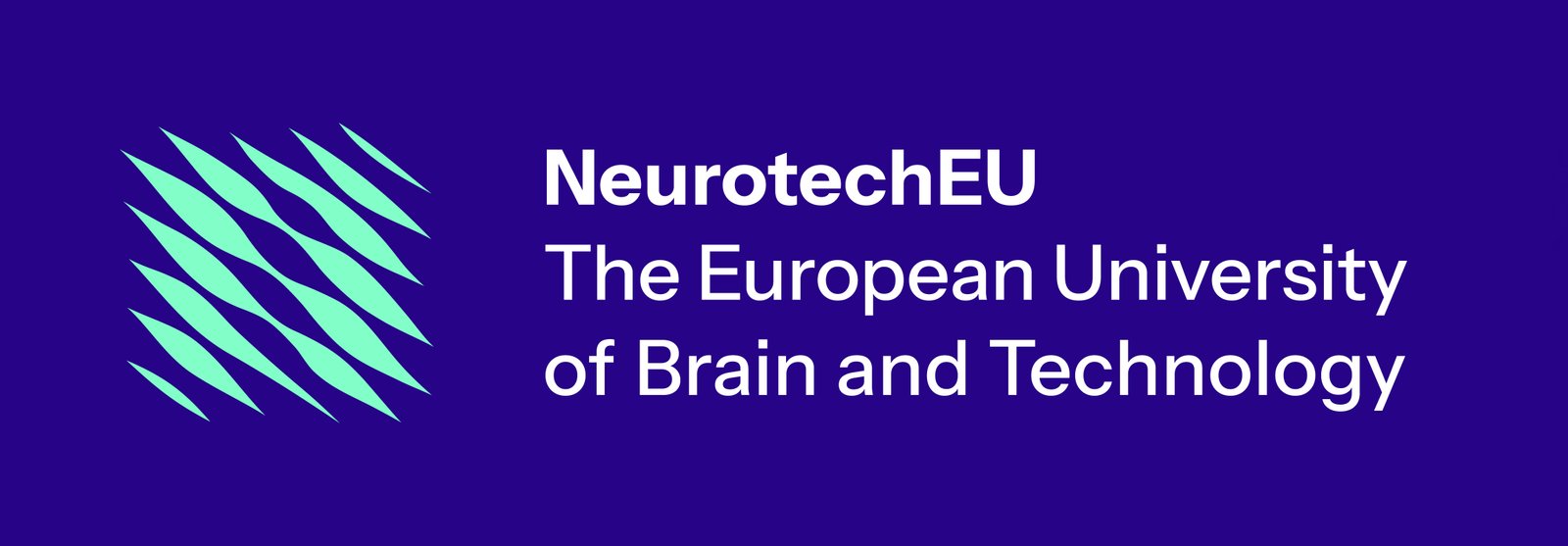8 dimensions of neurotechnology
NeurotechEU posits an eight-dimensional space that defines the envelope of current and future research, education, and application of neurotechnology.
Empirical and clinical neuroscience
Empirical and clinical neuroscience relies on the continuous advancements in neuroscience technologies, leading to an exponential increase in data generation. This field emphasizes the correlation between specific manipulations and observed brain states over hypothesis-driven research on brain organization principles. For example, deep brain stimulation (DBS) for Parkinson’s disease has revolutionized treatment for patients unresponsive to medication, showcasing neurotechnology's transformative impact in clinical settings.
Example
Deep brain stimulation (DBS) helps control symptoms in Parkinson’s disease by sending electrical impulses to specific brain areas.
Neuromorphic computing
Neuromorphic computing aims to replicate the structure and function of neural circuits in electronic hardware, offering an alternative to traditional computer architectures. This approach promises high computational efficiency with reduced power consumption, essential for advancing neurotechnology applications.
Example
Models of visual processing in the brain help improve computer vision systems, enabling technologies like facial recognition and autonomous vehicles.
Theoretical neuroscience
Theoretical neuroscience provides the foundation for developing and deploying neurotechnologies by elucidating the organizational principles of the mind and brain. This field bridges empirical neuroscience and technology through computational models that predict and explain brain functions.
Example
Neuromorphic processors in smartphones enable advanced features like real-time language translation and more efficient voice recognition.
Neuromorphic control / neurorobotics
Neuromorphic control integrates neuromorphic computing with robotics, creating systems that interact with the real world through sensors and effectors. This field is crucial for developing soft robotics that emulate the compliance and dynamic configuration of biological bodies.
Example
A robotic arm that moves smoothly and naturally, controlled by brain-inspired technology.
Neuroinformatics
Neuroinformatics develops tools and methods for analyzing and controlling brain-derived artifacts, fostering coherence and synergy between neuroscience and neurotechnology. This field focuses on creating integrated systems and multi-scale brain models to guide technological development.
Example
Brain atlases that map different brain regions to improve targeted therapies.
Neuroprosthetics
Neuroprosthetics involves creating devices that interface with the brain to restore or enhance neural functions. This field exemplifies neurotechnology by combining brain state sensing, signal processing, and functional modulation to achieve therapeutic outcomes.
Example
A prosthetic limb controlled by the user's brain signals for natural movement.
Clinical neurotechnology
Clinical neurotechnology focuses on integrating intervention and monitoring systems into digital brain health pipelines for patient care. This domain aims to revolutionize healthcare delivery through advanced, patient-specific neurotechnologies.
Example
Remote monitoring systems for tracking and managing neurological conditions at home.
Neurometaphysics
Neurometaphysics explores the philosophical, ethical, and legal implications of neurotechnology, emphasizing the need for interdisciplinary analyses. This field addresses the broader impact of neurotechnologies on society and human capabilities.
Examples
Evaluating the ethical implications of brain-computer interfaces (BCIs) for privacy and consent, ensuring that users' brain data is protected and used responsibly.
Analyzing legal frameworks for the use of neurotechnologies in criminal justice, such as determining the admissibility of neuroimaging evidence in court.
Exploring the philosophical questions around artificial intelligence and consciousness, such as whether machines with advanced neural networks could possess self-awareness or moral rights.
Definition of neurotechnology
Neurotechnology refers to devices, systems, and procedures—encompassing both hardware and software—that directly access, monitor, analyze, predict or modulate both the human and non-human nervous system in order to understand, influence, restore, or anticipate its structure, activity, function, or intentions (speech, motor). Neurotechnology combines elements of neuroscience, engineering, and computing.
Source: UNESCO's recommendation on the Ethics of Neurotechnology

CAMPUS+
CAMPUS+
NeurotechEU CAMPUS+ is a digital campus where students can:
- Learn about courses on offer
- Meet with their peers
- Follow online courses
- Manage their blended learning experience
Graduate School
NeurotechEU Graduate School will train students in a multidisciplinary, international and intersectoral setting.
- Each student will be advised by 3 mentors; two from partnering universities and the third from the industrial or societal partners
- All projects will focus on a Neurochallenge, i.e. societal challenge that can be met by neuroscientific knowledge and/or neurotechnological solution
- Admissions to this top-tier graduate school will be highly competitive and centrally organized
- By graduation each student will have an intersectoral experience with a strong multidisciplinary research background

Graduate School

Lifelong Learning Center
Lifelong Learning Center
NeurotechEU Lifelong Learning Center will:
- Deliver the necessary knowledge, skill sets and competencies for continued learning throughout life
- Help individuals to adapt to the changing personal, civic, societal and employment related needs
- Provide access to the necessary education and experience for individuals to pursue opportunities in brain research and technologies
- Organize certificate programs, micro-degrees, boot-camps, and offer internships, research opportunities and transferable skill training
NeurotechEU Spaces
NeurotechEU Spaces will be the online meeting spot for all students, learners, staff and researchers at NeurotechEU. It will:
- Provide tools to create, store and share information safely on the cloud
- Offer streaming and messaging platforms for real-time communication
- Issue shared blackboards, sandboxes and digital lockers
- Help create a paperless European University

NeurotechEU Spaces

NeurotechEU Ecosystem
NeurotechEU Ecosystem
NeurotechEU Ecosystem will integrate NeurotechEU with society and economy. It will help:
- Students to have easy access to internships, apprenticeships and intersectoral training opportunities
- Companies to access skilled and creative individuals
- To create new business opportunities through knowledge and technology transfer from universities to (societal) stakeholders
- Assist NeurotechEU with the development of new technologies to diversify and improve education
